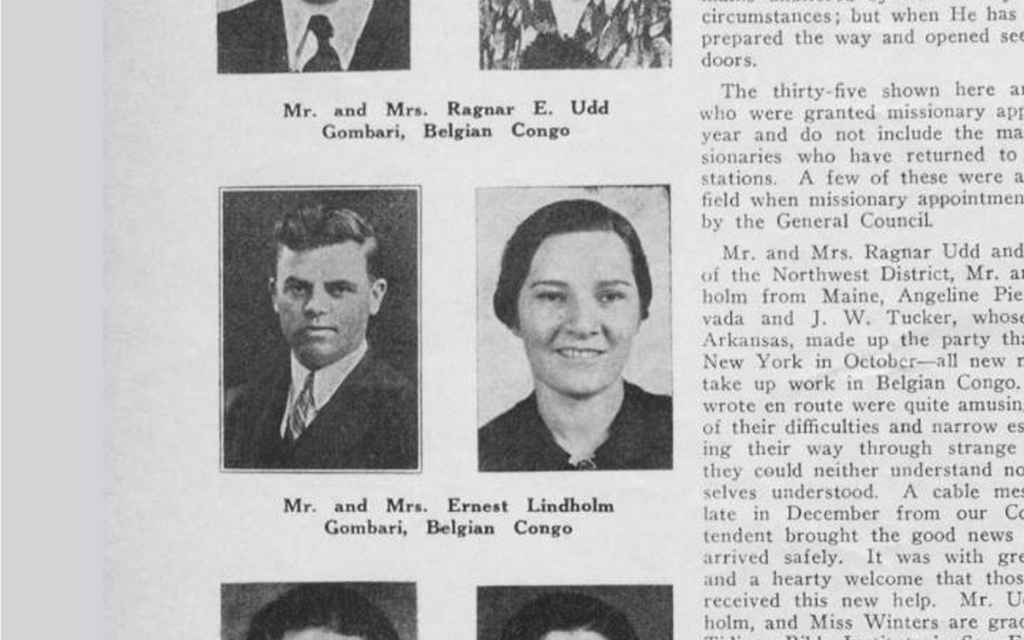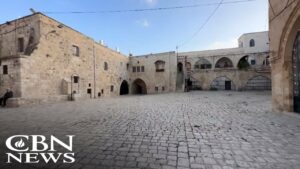Ernest and Grace Lindholm: Pioneer Assemblies of God Missionaries to Congo
This Week in AG History–December 21, 1940 By Ruthie Edgerly ObergOriginally published on AG News, 21 December 2023 Assemblies of God missionary Ernest Paul Lindholm (1907-1940) committed his life in service to God with a passion for African people. He died … Continue reading

This Week in AG History–December 21, 1940
By Ruthie Edgerly Oberg
Originally published on AG News, 21 December 2023
Assemblies of God missionary Ernest Paul Lindholm (1907-1940) committed his life in service to God with a passion for African people. He died in the jungle just one year after arriving in the Belgian Congo. When asked the question on his missionary application in 1937, “Do you realize that certain privations and sacrifices are involved in a missionary career and do you seek appointment with the full knowledge of such possibilities and a readiness to meet them with persistent courage for Christ’s sake?” The young man, along with his fiancé, Grace Wallace, answered, “Yes.”
When Ernest and Grace set sail for the Congo in October of 1939, he was a proud husband of less than five months. Joining them on their journey were five other newly appointed missionaries: three singles — Angeline Pierce and Jay Tucker (who later married), and Gail Winters; and one couple — Ragnar and Alice Udd. Their plans had been to go to language school in Belgium, but the outbreak of World War II made that impossible, and so they traveled directly to their appointed station, taking a boat up the Nile River and settling in the Belgian Congo village of Nobe.
Ernest, a young minister with the New England district, was described as “a rare example of complete dedication to God.” He was originally appointed to serve in the Gold Coast of Africa with another single missionary, but the other missionary was unable to fulfill his commitment and so Ernest was reappointed to the Congo. By that time, he had married Grace Wallace, who also had committed her life to serve in Africa before their marriage, and she was very early in their first pregnancy when they arrived in the Congo on her birthday, Nov. 26, 1939. Their son, Stephen Paul, was born in May of 1940.
Most of their initial time was spent in establishing initial friendships, becoming familiar with the language, and opening up a construction site. Due to the outbreak of war, support checks were often delayed in arrival, so Ernest negotiated with Congolese construction workers to provide meat in exchange for labor, even though he was not overly interested in African big game hunting.
On the one-year anniversary of their arrival, Ernest awoke early in the morning with the goal in mind of finding a buffalo to pay his workers and surprise his wife with the special treat of meat for her birthday. He left before she awoke, gathered a few Congolese friends, and went to find one of the buffalo that often approached their camp.
Grace began preparing breakfast for his return when two women came running up the road and told them that an animal had killed “Bwana” (the Swahili word for “Master”). Many Congolese rushed out to help the young man they had grown to love in the past year, but found that he had been gored by a wounded African Cape Buffalo, one of the most dangerous animals on the continent. The Dec. 21, 1940, Pentecostal Evangel published news about his death in an article titled, “Young Missionary Called to His Reward.”
When fellow missionary Gladys Taylor confirmed to Grace that her husband was dead, one of the first things she said was, “Do you think they will send me home?” Grace had felt a call to service in Africa before she was married and was concerned that the Assemblies of God would not allow a young single woman with a 6-month-old son to remain in the jungles of Africa. When Gladys Taylor wrote to Noel Perkin, the director of the missions department, regarding Ernest’s death and the desire of Grace to stay, she stated, “Mrs. Lindholm speaks well in Bagala and has a very sweet spiritual ministry.” She described Grace as having a ministry very “broken” before the Lord and “I am sure it will be more so now after this great sorrow. Such a ministry is greatly needed here.”
Grace and Stephen were allowed to stay in the Congo until she returned home for furlough in 1945. While at home, she studied practical nursing at the Salvation Army Hospital in New York. This proved to be invaluable as a need was presented in 1948 for a leper home in the Congo. Grace later wrote of this opportunity, “I left the sphere of self-reliance and entered the realm of utter dependence on the Lord. We had no money, no equipment, no land . . . to begin our work.” By 1954, Grace was providing for more than 300 lepers under her constant treatment.
Grace stayed in the Congo for 22 years after her husband’s death. She retired to New York and on March 29, 1993, her son Stephen stopped by her house to bring her the newspaper and found her unresponsive. She died that afternoon from a massive heart attack.
As Gladys Taylor remarked to Noel Perkin that the ministry of broken people was much needed in the Belgian Congo, Grace Lindholm fit that description. Although her 1939 missionary interviewer remarked, “No one has pointed out any weakness in her,” it was her brokenness that God used to minister to broken people. As she said to many who urged her to return to the States after her husband’s death, “God’s grace is sufficient.”
Read the report on Ernest Lindholm’s death on page 8 of the Dec. 21, 1940, issue of the Pentecostal Evangel.
Also featured in this issue:
• “Salvation, Separation, Satisfaction” by E.S. Williams
• “Some Hindrances to Healing,” by Carrie Judd Montgomery
• “Pentecost in Central America,” by Melvin Hodges
And many more!
Click here to read this issue now.
Pentecostal Evangel archived editions courtesy of the Flower Pentecostal Heritage Center.
Do you have Pentecostal historical materials that should be preserved? Please consider depositing these materials at the Flower Pentecostal Heritage Center (FPHC). The FPHC, located in the Assemblies of God national offices, is the largest Pentecostal archive in the world. We would like to preserve and make your treasures accessible to those who write the history books.
Flower Pentecostal Heritage Center
1445 North Boonville Avenue
Springfield, Missouri 65802 USA
Phone: 417.862.1447 ext. 4400
Toll Free: 877.840.5200
Email: archives@ag.org
Website: www.iFPHC.org




